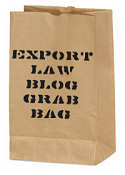![Smart Power Systems and Bahram Mechanic via http://www.smartpowersystems.com/content/main/corporateinformation.html [Fair Use] Smart Power Systems and Bahram Mechanic via http://www.smartpowersystems.com/content/main/corporateinformation.html [Fair Use]](https://www.exportlawblog.com/images/smartpower.jpg) Houston-based Smart Power Systems and its CEO Bahram Mechanic (as well as various other individuals) were indicted last week on charges that they exported certain export-controlled items to Iran without a license. The indictment alleges that certain uninterruptible power supplies, microcontrollers and digital signal processing chips, all allegedly classified as ECCNs 3A991, Â were transshipped through third countries to a company in Tehran, allegedly controlled by Mechanic.
Houston-based Smart Power Systems and its CEO Bahram Mechanic (as well as various other individuals) were indicted last week on charges that they exported certain export-controlled items to Iran without a license. The indictment alleges that certain uninterruptible power supplies, microcontrollers and digital signal processing chips, all allegedly classified as ECCNs 3A991, Â were transshipped through third countries to a company in Tehran, allegedly controlled by Mechanic.
Not surprisingly, the indictment tries to make the case that these run-of-the-mill electronic items are critical military goods that Iran can use to launch missiles and build nuclear bombs. Of course, the government’s credibility in its assessment of the alleged capabilities of these items is rather diminished by its claim that these items are classified as ECCN 3A991, one of the least stringent export controls under the Export Administration Regulations. At best, however, the microcontrollers are 3A991.a, which covers microprocessors meeting certain computational benchmarks. The uninterruptible power supplies are not covered at all by 3A991 and are almost certainly EAR99.
Worse, for the government, if the uninterruptible power supplies are EAR99, Â then the government’s theory of what laws were broken by their exports to Iran completely collapses. The indictment alleges that the defendants violated the International Emergency Economic Powers Act because no license was obtained from the Bureau of Industry and Security (“BIS”). Apparently, no one at the DOJ looked at EAR Section 746.7, which indicates that a BIS license is required only for certain items. EAR99 items are not among them.
Of course, a license from the Office of Foreign Assets Control (“OFAC”) is required to export EAR99 items from the United States to Iran. But the government is not alleging Mechanic and Smart Power needed an OFAC license; instead, it is saying they  didn’t have a BIS license even though they did not need that license. If the government can’t get the law it is enforcing right, it should not try to send people to jail for violating it.

 Posted by
Posted by  Category:
Category: 

 Here are a few recent developments that you may have missed:
Here are a few recent developments that you may have missed:![Casa Espada airbnb listing via https://www.airbnb.com/rooms/5701299?s=yz00 [Fair Use] Casa Espada airbnb listing via https://www.airbnb.com/rooms/5701299?s=yz00 [Fair Use]](https://www.exportlawblog.com/images/airbnb_havana.jpg) The revised Cuba sanctions created a
The revised Cuba sanctions created a ![By Poa Mosyuen (Own work) [CC-BY-SA-3.0 (http://creativecommons.org/licenses/by-sa/3.0)], via Wikimedia Commons http://commons.wikimedia.org/wiki/File:HK_%E7%9F%B3%E5%A1%98%E5%92%80%E5%B8%82%E6%94%BF%E5%A4%A7%E5%BB%88_Shek_Tong_Tsui_Municipal_Services_Building_%E9%9B%BB%E8%85%A6%E9%8D%B5%E7%9B%A4_Chinese_input_keyboard_Jan-2012.jpg By Poa Mosyuen (Own work) [CC-BY-SA-3.0 (http://creativecommons.org/licenses/by-sa/3.0)], via Wikimedia Commons http://commons.wikimedia.org/wiki/File:HK_%E7%9F%B3%E5%A1%98%E5%92%80%E5%B8%82%E6%94%BF%E5%A4%A7%E5%BB%88_Shek_Tong_Tsui_Municipal_Services_Building_%E9%9B%BB%E8%85%A6%E9%8D%B5%E7%9B%A4_Chinese_input_keyboard_Jan-2012.jpg](https://www.exportlawblog.com/images/chinese_keyboard.jpg) Yesterday the Office of Foreign Assets Control published an
Yesterday the Office of Foreign Assets Control published an ![PayPal Campus Outdoor by PayPal via https://www.paypal-media.com/assets/zip/PayPal_HQ_Campus_Outdoor.jpg [Fair Use] PayPal Campus Outdoor by PayPal via https://www.paypal-media.com/assets/zip/PayPal_HQ_Campus_Outdoor.jpg [Fair Use]](https://www.exportlawblog.com/images/PayPal_HQ_Campus_Outdoor.jpg) Internet payment facilitator PayPal recently
Internet payment facilitator PayPal recently 

